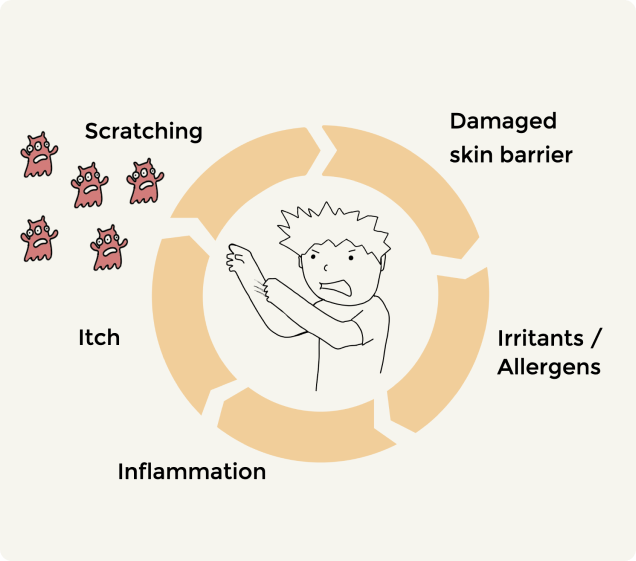
Kids in Control
The aim of this study is to develop online support material to help reduce scratching in children with eczema.
Developing a virtual habit reversal programme
Kids in Control aims to develop and assess the acceptability, usability, and feasibility of virtual habit reversal programme material for children with eczema to reduce the itch/scratch cycle.
We will follow the Person-Based Approach to intervention development to ensure the intervention is acceptable, meaningful, and optimally engaging to children with eczema.
Draft intervention materials will be refined through a series of qualitative think-aloud interviews to produce a meaningful and optimally engaging intervention ready for further evaluation in a feasibility trial.Kids in Control aims to develop and assess the acceptability, usability, and feasibility of virtual habit reversal programme material for children with eczema to reduce the itch/scratch cycle.
We will follow the Person-Based Approach to intervention development to ensure the intervention is acceptable, meaningful, and optimally engaging to children with eczema.
Draft intervention materials will be refined through a series of qualitative think-aloud inmax-w-3xl flexterviews to produce a meaningful and optimally engaging intervention ready for further evaluation in a feasibility trial.
Challenges of Atopic Dermatitis and current interventions
Atopic dermatitis (AD) is a very itchy skin condition. Habitual scratching begins in infancy and the chronic itch-scratch cycle promotes skin inflammation, infection, affects sleep and has a great psycho-social impact on children and their extended families.
Habit reversal has been used as an intervention to reduce scratching and improve eczema but published interventional randomised controlled trials are of poor methodological design, non-standardised and only one has been completed in children. It is difficult and time-consuming for children/carers to attend hospital appointments and Covid-19 has necessitated a drive towards virtual delivery of care.

Participate in the programme
itch scratch cycle graphic damaged skin barrier – irritants/allergens – inflammation – itch – scratching – and round again
The aim of this study is to develop online support material to help reduce scratching in children with eczema.
We would like to talk to children with eczema of all severities aged 8-12 years, who feel that scratching is a problem for them and their parents/carers to ask for their feedback on our online material. This will help us improve it and make it ideal for this age group.
If you choose to participate, you and your child will be invited to do an online think-aloud interview and /or a virtual focus group with 2-5 other children and their parents or carers.
Project collaborators
Maria Akinde
Clinical Nurse Specialist in Paediatric Dermatology, St John’s Institute of Dermatology, Guy’s & St Thomas’ NHS Foundation Trust
Dr Rukshana Ali
Paediatric Clinical Psychologist, St John’s Institute of Dermatology, Guy’s & St Thomas’ NHS Foundation Trust

Dr Susannah Baron
Consultant Paediatric Dermatologist, St John’s Institute of Dermatology, Guy’s & St Thomas’ NHS Foundation Trust Dr Alpa Kanji, Consultant Paediatric Dermatologist, St John’s Institute of Dermatology, Guy’s & St Thomas’ NHS Foundation Trust
Dr Alpa Kanji
Consultant Paediatric Dermatologist, St John’s Institute of Dermatology, Guy’s & St Thomas’ NHS Foundation Trust

Prof Carsten Flohr
Consultant Paediatric Dermatologist and Chair in Dermatology and Population Health Science at King’s College London.
Prof Miriam Santer
GP and Professor of Primary Care Research, University of Southampton

Dr Ingrid Muller
Health Psychologist, School of Primary Care, University of Southampton
Funded by UKDCTN




